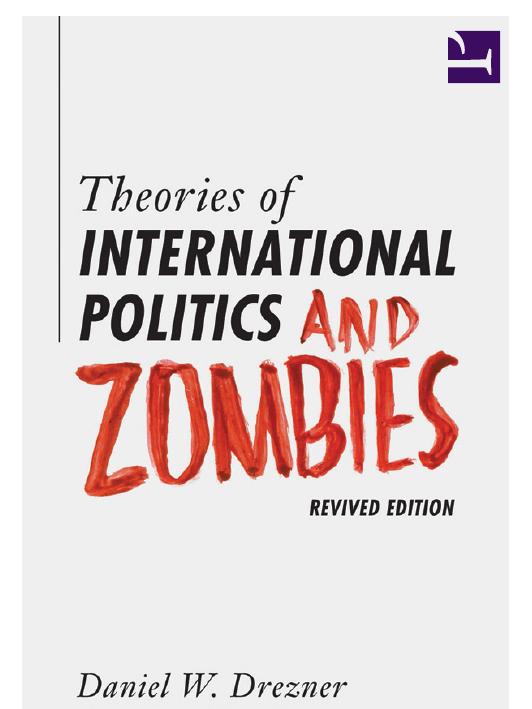Theories of International Politics and Zombies: Revived Edition by Daniel W. Drezner

Author:Daniel W. Drezner [Drezner, Daniel W.]
Language: eng
Format: epub, pdf
Tags: Political Science, International Relations, General, History & Theory
ISBN: 9781400852284
Google: dg7rAwAAQBAJ
Publisher: Princeton University Press
Published: 2014-10-26T20:52:39+00:00
Any effort to combat the zombie problem globally would therefore have to be married to a strong counter-zombie effort at home. Even if this was done, one could envision “zombie fatigue” making inroads into public support for overseas operations.* Over time, public sentiment would likely turn against ongoing, far-flung operations that entailed high costs in blood and treasure. This would be true regardless of the foreign policy benefits of such operations. As recent public opinion data suggests, protracted military conflict, combined with a severe economic recession, will lead to increased isolationism from the American masses.10 Even the most charismatic commander in chief will encounter the limits of a “press the flesh” strategy when coping with a surly American public.
Interest groups could affect a state's domestic and foreign counter-zombie policies in multiple ways. There are groups with a vested interest in constraining the eradication of the living dead. The actors with the most immediate stake in sabotaging any attack on zombies are those who have been bitten by zombies, and their human relatives. By definition, the moment humans are bitten, they will inevitably become zombies. This fact can dramatically alter their preferences. This change of mind occurs in many zombie films. In George Romero's Land of the Dead (2005), the character of Cholo has the most militant anti-zombie attitude at the outset of the film. After he is bitten, however, he decides that he wants to “see how the other half lives.” In Peter Jackson's Dead Alive (2002), as well as Romero's Dawn of the Dead (1978) and Survival of the Dead (2010), family members keep their undead relatives hidden from security and paramilitary forces.
Clearly, soon-to-be-ghouls and their relatives can hamper policy implementation. Paradoxically, a failure to implement early measures will force governments to pursue more extreme measures—which, in turn, will be likely to trigger a greater public backlash. The opening sequences of Romero's Dawn of the Dead suggest that one reason the zombie problem spins out of control is public hostility to harsh government measures and recommendations—martial law, the abandoning of private residences, and the extermination of undead relatives chewing the flesh away from the bones of loved ones.
The soon-to-be-undead and their relatives might hinder policy implementation, but they are too fragmented and ephemeral a grouping to immediately influence the direction of policymaking. Defense contractors are another matter entirely. These actors have a significant stake in the allocation of resources devoted to combating zombies. While the idea of a singular, cohesive zombie-industrial complex stretches credulity, some corporations in the security sector would undoubtedly be intrigued by the military applications of zombies. In many cases—the films Return of the Living Dead (Dan O'Bannon, 1985), Planet Terror (Robert Rodriguez, 2007), Zombie Strippers (Jay Lee, 2008), and the Resident Evil franchise—these firms are the very progenitors of the zombie problem. Even if private firms were not the cause of the undead menace, they would no doubt be interested in exploiting the research and development opportunities posed by the reanimation of dead human tissue.
The
Download
Theories of International Politics and Zombies: Revived Edition by Daniel W. Drezner.pdf
This site does not store any files on its server. We only index and link to content provided by other sites. Please contact the content providers to delete copyright contents if any and email us, we'll remove relevant links or contents immediately.
The Secret History by Donna Tartt(19052)
The Social Justice Warrior Handbook by Lisa De Pasquale(12187)
Thirteen Reasons Why by Jay Asher(8893)
This Is How You Lose Her by Junot Diaz(6877)
Weapons of Math Destruction by Cathy O'Neil(6264)
Zero to One by Peter Thiel(5786)
Beartown by Fredrik Backman(5737)
The Myth of the Strong Leader by Archie Brown(5499)
The Fire Next Time by James Baldwin(5431)
How Democracies Die by Steven Levitsky & Daniel Ziblatt(5215)
Promise Me, Dad by Joe Biden(5141)
Stone's Rules by Roger Stone(5081)
A Higher Loyalty: Truth, Lies, and Leadership by James Comey(4953)
100 Deadly Skills by Clint Emerson(4920)
Rise and Kill First by Ronen Bergman(4779)
Secrecy World by Jake Bernstein(4741)
The David Icke Guide to the Global Conspiracy (and how to end it) by David Icke(4701)
The Farm by Tom Rob Smith(4502)
The Doomsday Machine by Daniel Ellsberg(4484)
